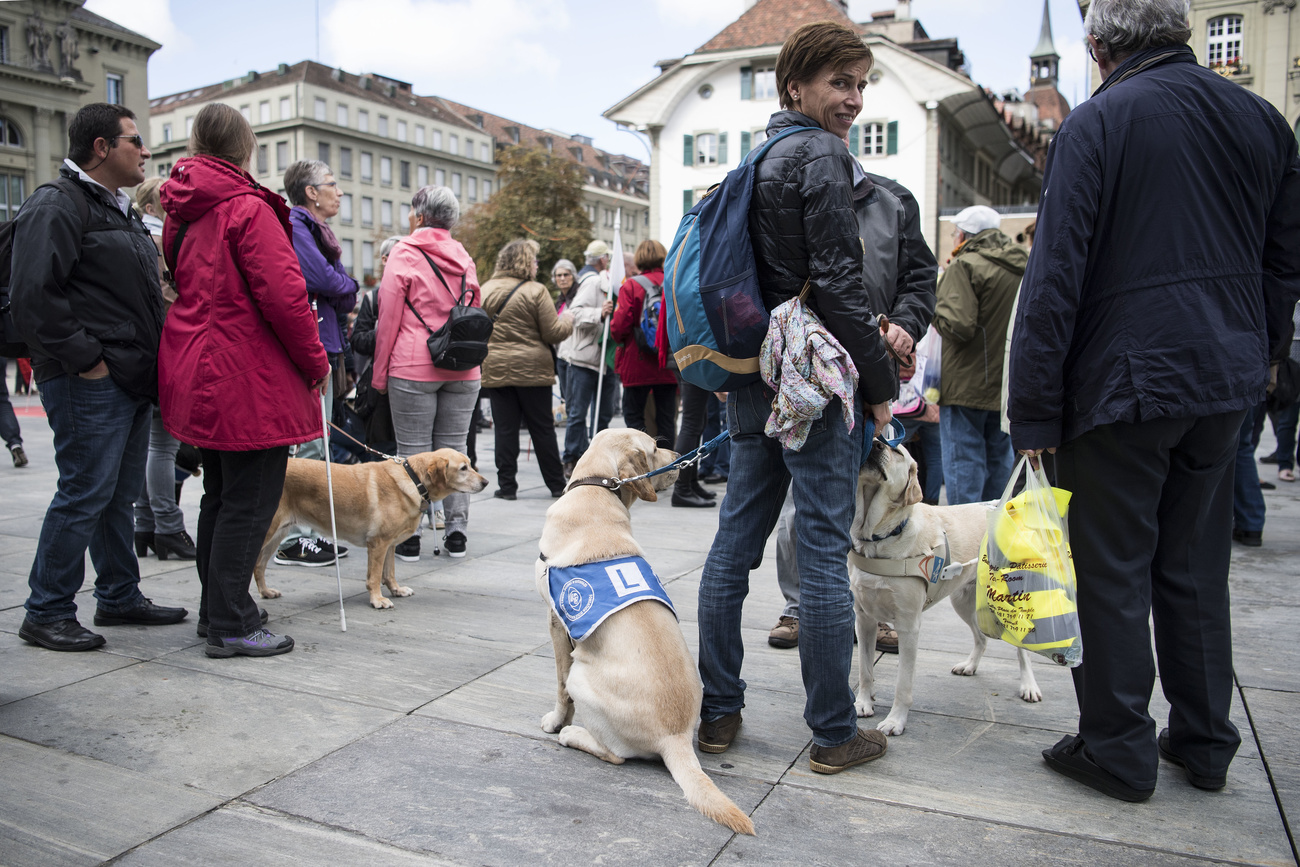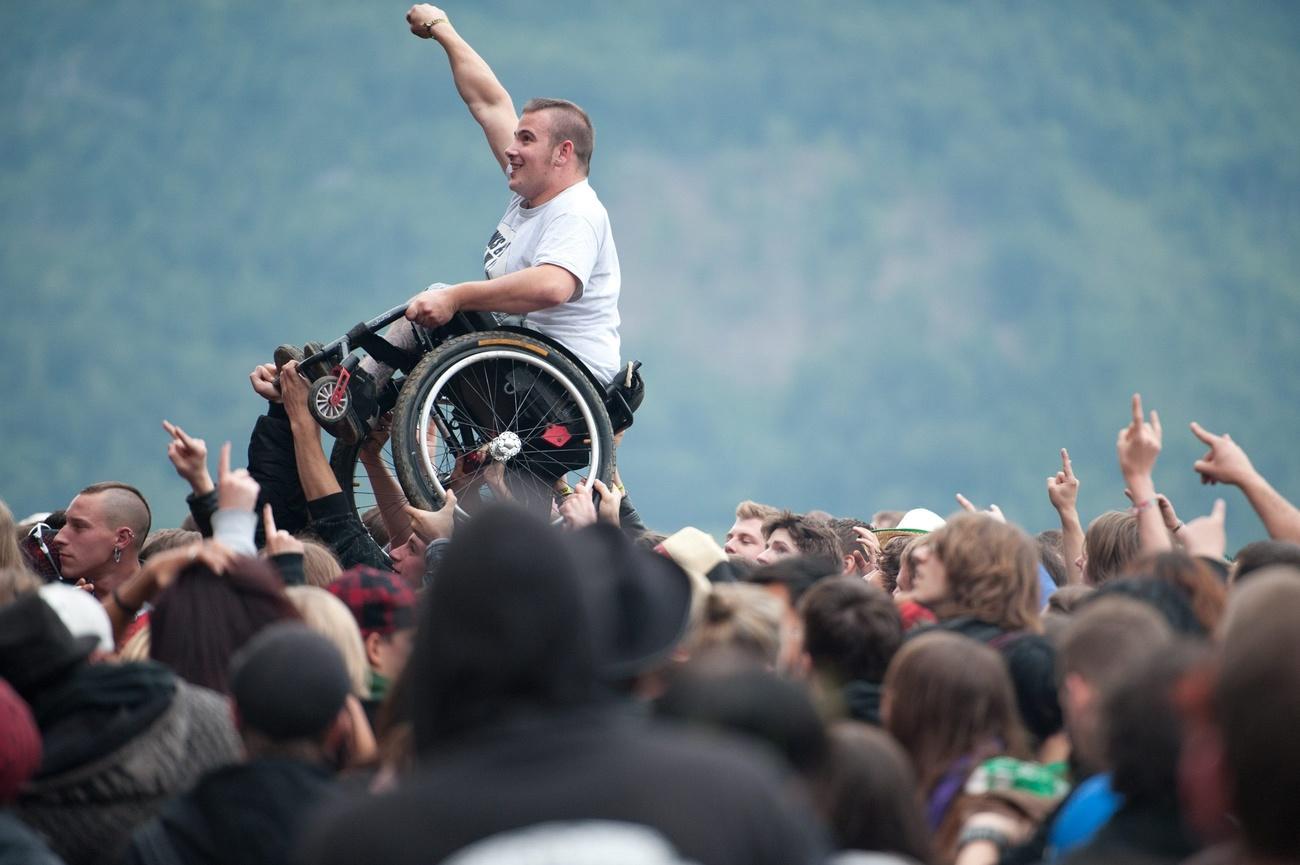‘A disability is a characteristic like the colour of your eyes’

Marah Rikli is a journalist, bookseller, presenter and the mother of a child with a disability. She talks to SWI swissinfo.ch about inclusive education, social roles, injustice, diversity and her hopes.
Marah RikliExternal link doesn’t like injustice. Especially not when the most vulnerable and defenceless are on the suffering end – like her daughter. Ronja (not her real name) is almost nine and will be starting third grade at a primary school in Zurich in August.
Ronja is a special child, as all daughters are. But she is more special than others: she has a developmental disorder. That is the short definition of the characteristic which makes her unique.
The long definition: Ronja has speech developmental language disorder, attention deficit hyperactivity disorder (ADHD), compulsions and hypotonia, mental impairment and much more.

Ronja is a special child, and as such she attracts the attention of the people around her in everyday life. For example, on the bus to the public swimming pool. Ronja and Marah sit in the last two free seats. It is scorching hot. The automatic doors snap shut with a loud noise.
Ronja screams and swears at the door and points her finger at it. A woman on the bus asks her what her problem is. Ronja responds by screaming even louder and showing her the palm of her hand, which means “stop” in sign language. The woman doesn’t understand and calls her rude.
Marah knows that Ronja can only be calmed with quiet. She drowns out all the noise on the bus with her voice and explains to the woman that her daughter has a problem with doors, that she has autism. Embarrassed silence.
Rikli can’t explain in every situation that her child has a developmental disorder with autistic features – this would take up too much time and Ronja would scream even louder.
Rikli therefore mentions the diagnosis which is most similar to Ronja’s disability and which many people understand, even if they have prejudices about it.
Want to read our weekly top stories? Subscribe here.
Almost a swear word
I meet Marah Rikli in a local restaurant in Wipkingen in Zurich. It’s difficult to find a quiet table. On one side there’s a railway line under construction, on the other a busy road.
On a sunny day in late spring, we choose not to sit outside and rather look for a spot indoors. But even here we can hear the noises from the kitchen and the bar. We start the conversation with a sense of frustration.
It’s a feeling that Rikli knows well and experiences almost daily. Rikli is an author, a trained bookseller, and a moderator. She regularly writes about life with her daughter, which she publishes in “Mamablog: Life with a disabled child” in the Tages-Anzeiger newspaper, on the ellexx platform and in the teachers’ magazine Rundgang.
The description of the bus journeyExternal link mentioned above is taken from one of her reports. With her articles, she wants to make the invisible visible and give a voice to those who don’t have one.
“My children have politicised me,” she says. “First it was feminism. As a mother, I realised what this country has failed to do in recent decades. For example, the promotion of measures to balance work and family.”
“Then, I didn’t want to conform to what society expects of a mother: to always be by her children’s side because they’re her only project in life. And if there are problems at school, it’s the mother’s fault, never the father’s.”
Rikli doesn’t fit into this picture. She is used to swimming against the tide. As a girl, she identified with those who were different, with the non-conformists. When Ronja was born, Rikli saw people’s judgmental eyes on her, which still made her feel guilty.
“In our society, disability has negative connotations,” she says. “It’s almost a swear word: something to hide, something to be ashamed of. Instead, it should be seen as a characteristic, like the colour of your eyes or a hat.”
Rikli has learnt this from many conversations with activists for inclusion such as the German Raul Krauthausen and the Swiss presenter Jahn Graf.
‘[Disability] is almost a swear word: something to hide, something to be ashamed of.’
Marah Rikli
Rikli is in talking mood: by now her espresso has gone cold. During a break, I ask what inclusion means to her.
“My daughter goes to a special needs school. There are five to eight children in the classes, supported by two to three people with appropriate training in logopaedics, psychotherapy or therapeutic pedagogy. And then there’s the canteen and the daycare centre, an environment in which Ronja feels comfortable,” Rikli says.
“I know it’s a contradiction that I’m committed to the inclusion of people with disabilities on the one hand and sending my daughter to a special needs school on the other. But it’s the best solution both for my daughter and for me: I can take a breath and be active in my job.”
Before we met, Rikli did a few lengths in the public swimming pool. Afterwards, she will finish writing up an interview. In the evening, she will moderate a debate as part of the programme called “Karl*a der*die Grosse”.
Rikli also has an 18-year-old son who is in vocational training. He attended school in a regular class. In the final years of his compulsory education, he was diagnosed with ADHD. In primary school, he received integration support and pedagogical-psychomotor therapies.
Lack of resources
“In my opinion, there are not enough resources in regular schools,” Rikli says. “The classes are too big to promote the inclusion of children with special needs. And then there’s all the pressure, the race to get into high school: for some areas of life, it’s a must.”
Rikli has been concerned about the situation in schools for some time. “Who has access to education? Who is discriminated against in the educational system?” she asks.
“Depending on whether the child has a disability, comes from a working-class background, is fat or not white, they are treated differently to white, non-disabled children from academic households. We don’t have equal opportunities in Switzerland, even though we are often led to believe that we do.”
She knows that there are many teachers who go out of their way for their pupils, students and classes. They have a hard time: big classes, problematic pupils, demanding parents, little social recognition.
Rikli argues that too little is written about positive stories, committed teachers and successful inclusion. “Perhaps integration into a regular class isn’t always the best solution, at least not for my daughter,” she admits.
“A complete change of the school system would presumably make the path towards real integration easier. Of course, that won’t happen overnight. But it’s the wish of a mother of two children who don’t fit into the norm.”
Rikli doesn’t say this with a tired expression, but with a determined one. Her fight for an inclusive society is not finished yet. We say goodbye at the bus stop.
She is alone today. It would be different with her daughter. She would bring to the surface what is invisible, latent. The lack of understanding for what is different.
Adapted from German by Claire Micallef/dos

In compliance with the JTI standards
More: SWI swissinfo.ch certified by the Journalism Trust Initiative













You can find an overview of ongoing debates with our journalists here . Please join us!
If you want to start a conversation about a topic raised in this article or want to report factual errors, email us at english@swissinfo.ch.